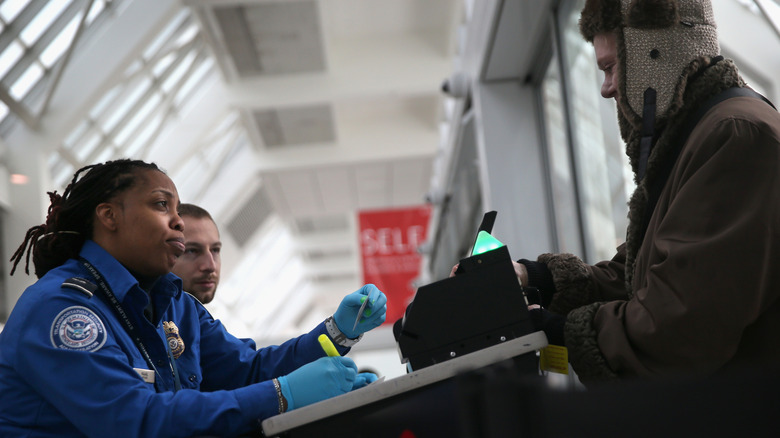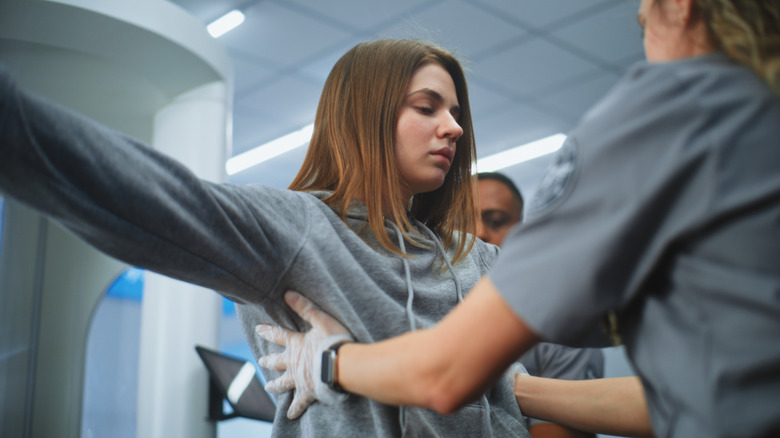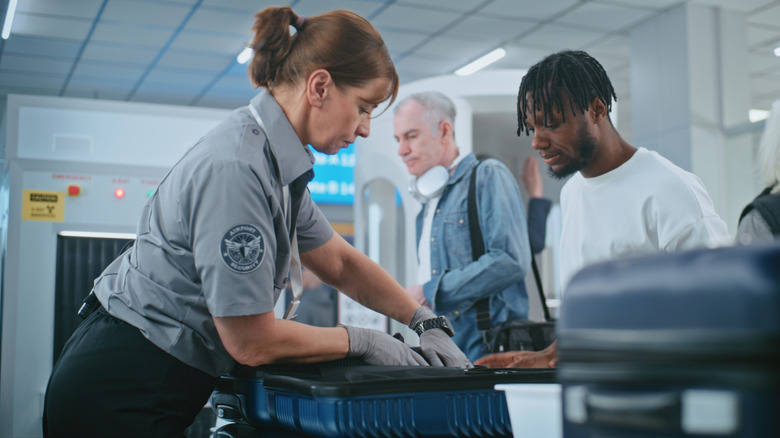TSA Is Always Watching For This Involuntary Reflex, And You Could Get Flagged
If you're going through the TSA checkpoint at the crack of dawn, or bored out of your mind waiting in one of the worst airports in America for security wait times, you probably won't be the only passenger who is nearly sleepwalking. That being said, there is one involuntary behavior that TSA agents will be on the lookout for, even if it's plausible that you can't help doing it because your body may be trying to naturally help your brain wake up and bust through that pre-coffee morning fog — or the boredom.
As part of its Screening of Passengers by Observation Techniques (SPOT) program, TSA has trained officers to specifically note passengers who exhibit high stress, deception, or fear at the security checkpoint. An exclusive, non-classified internal document obtained by The Intercept in 2015 pointed out that one of these behaviors, exaggerated yawning, is considered a deceptive behavior that should be closely monitored by officers. While many travelers may yawn a time or two in line, especially if someone around them is yawning, the TSA believes that yawning too much can be a sign that a passenger is up to no good. In 2015, the Government Accountability Office (GAO) noted that the TSA's logic was dubious at best. The TSA countered by saying it would make improvements to the program and how passengers would be targeted. At the time, a former Behavior Detection Officer noted that the broad definitions of the so-called "deceptive" behaviors gave the TSA "a license to harass" (via The Intercept).
What other involuntary signs does the TSA check for?
As part of the TSA's SPOT program, BSO agents are not only looking for yawning; one more major culprit that can slow down your screening time to a crawl is sweating. The TSA notes sweaty palms as a sign of stress, and a potential sign that a traveler may be hiding something. If you are sweating heavily, particularly around your private areas, you may have to get a quick pat-down before passing through the checkpoint. Even if your sweat is not visible, you still may get stopped because the body scanner technology has a hard time interpreting sweat, and this can sometimes cause a false alarm. If you are flagged, note that you don't have to get your pat down in public view. You can also request that a friend or loved one be present as a witness. If you're constantly sweating that you'll miss your flight, or are someone who is prone to yawning when bored, consider signing up for TSA PreCheck.
The TSA was created to protect flyers and prevent terrorist attacks in the skies, and they are aware that flying causes stress and anxiety for travelers across the country. If you're pulled aside, note that the TSA is primarily checking for things out of place. Passing through in a disguise or being dressed for Hawaii when your boarding pass says you're bound for Alaska, will not pass without scrutiny. Neither will a fake ID, especially now that the REAL ID Act is fully in effect.
What happens when you get flagged?
The TSA begins airport security before passengers arrive at the airport, and if you can't check in for your flight online or you see a secret code printed on your boarding pass, you'll have a clue that you'll be getting a more thorough search from the TSA. Unfortunately, there's no way around it, as by law, the TSA has to properly screen and vet each passenger and piece of luggage on passenger aircraft in the United States. If your behavior is flagged, your best bet is to cooperate with the officer. Whether it's nerves or stress, you won't be the only passenger who is uneasy at the airport. According to a survey by Coventry Direct, three out of 10 Americans have a fear of flying, with passengers from the South and Midwest generally having more doubts about the safety of air travel.
Suspicious behaviors aren't the only things that will hold you up in the security line; if you've left a full water bottle in your carry-on or forget to take your laptop out in the regular security line, a TSA agent will open and inspect the contents of your bag and rerun it. If the agent finds what the TSA deems as unusual items, such as duct tape, numerous phone cards, and photos of high-profile targets in your luggage, you will likely have a long chat. And if the agent finds something illegal, airport police will be called for further investigation.


